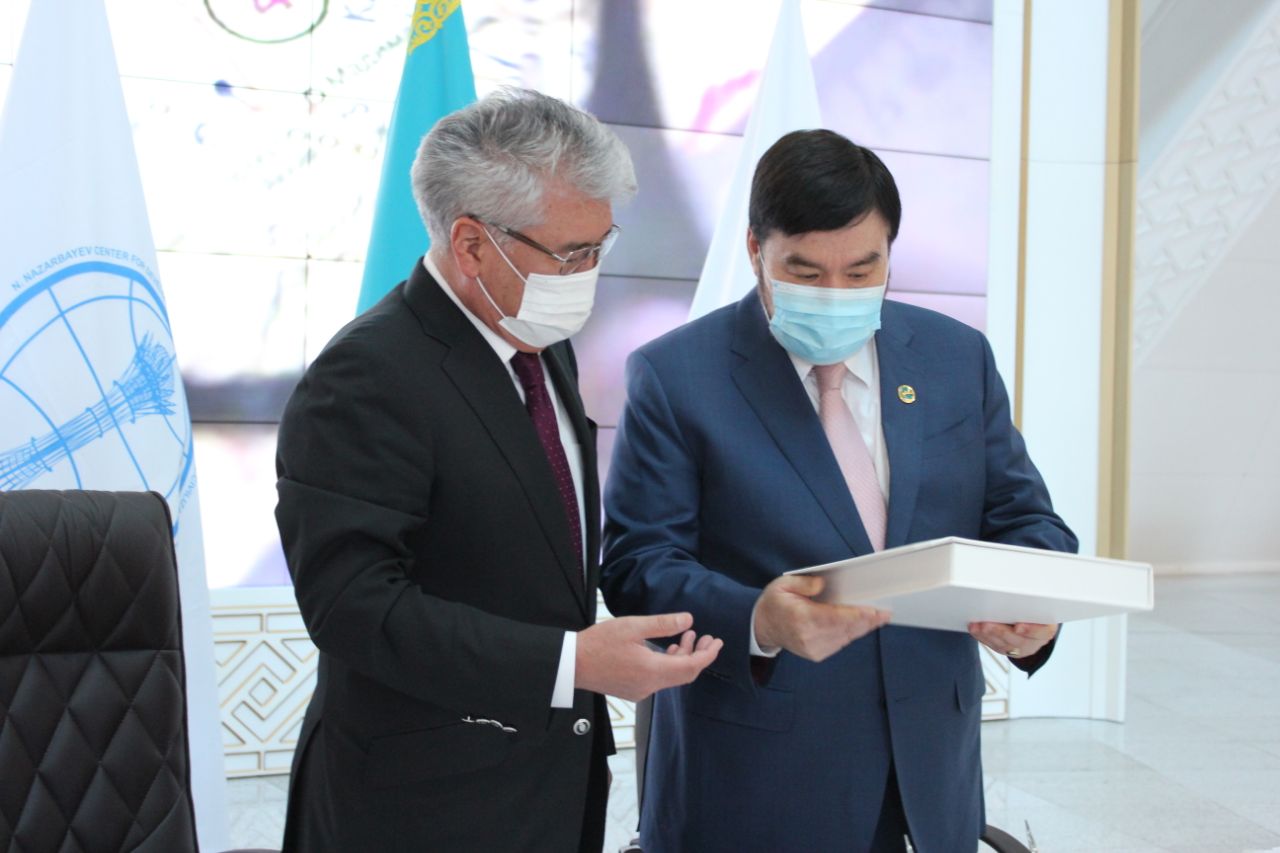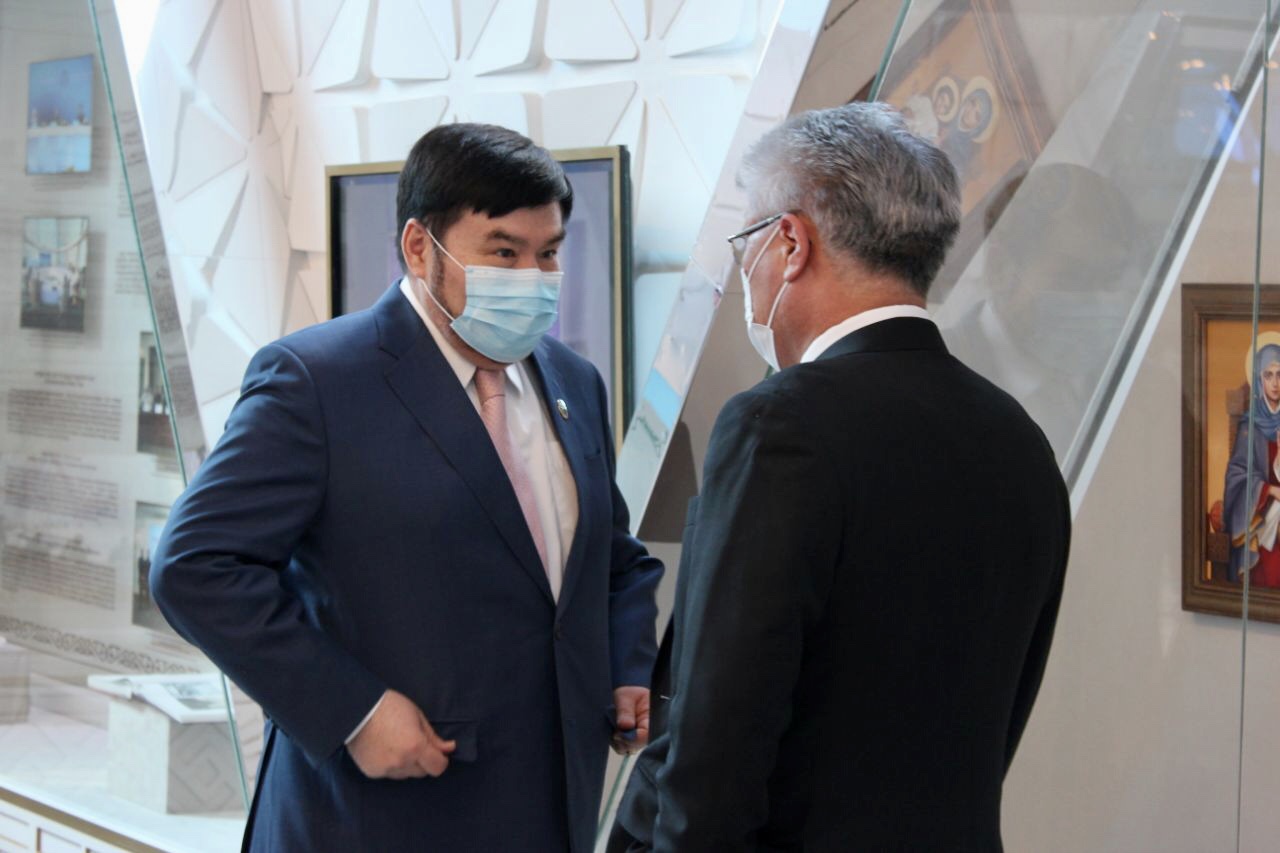In order to strengthen and develop partnerships, deepening cooperation in the field of culture, inter-civilizational, interreligious dialogue and consent, on April 2, 2021, Chairman of the Board of the N.Nazarbayev Center for Development of Interfaith and Inter-civilization Dialogue Bulat Sarsenbaev and Director of the National Museum of the Republic of Kazakhstan Arystanbek Muhamediuly signed a Memorandum of mutual cooperation.
Based on common values and mutual understanding, the parties intend to develop a partnership in the field of practical promotion of the Сongress of the Leaders of World and Traditional Religions, initiated by the first president of the Republic of Kazakhstan, Elbasy N. Nazarbayev and comprehensively supported by the President of the Republic of Kazakhstan K.K. Tokayev in the development of the global interfaithdialogue area. Cooperation in the implementation of scientific and cultural and educational projects, museum exhibitions, expositions, excursions aimed at strengthening the spiritual and historical heritage of Kazakhstan people, the significance of the unique foreign policy initiatives of the Republic of Kazakhstan in the field of international and regional security.
In addition, the Memorandum provides for a special thematic exhibition on the history of religions in Kazakhstan, the history of the world religion Islam and other creeds, the implementation of joint projects, consultations, international and republican conferences, seminars and symposia in the field of religion, interreligious and interfaith dialogue, theology, history, art and museum business, as well as familiarization of the partners of the N. Nazarbayev Center, foreign guests with the expositions of thematic exhibitions dedicated to the 30th anniversary of the independence of the Republic of Kazakhstan.
On a systematic basis, the exchange of scientific information, analytical, historical materials, documentation, as well as literature and bibliographic publications is scheduled.
As part of the signing of the Memorandum, the Chairman of the Board of the N.Nazarbayev Center Bulat Sarsenbaev stressed that the past, present and future of the country are measured primarily by the unity of the nation. The Kazakh people accepted representatives of various nationalities and ethnicities on their land, became a common home for more than 130 nationalities, 18 denominations.
«Without exaggeration, I can say that Kazakhstan today is the global model of public harmony and nationwide unity. The commitment to the policies of tolerance, the influence of a respectful relationship to representatives of any confession, the development of interreligious and interfaith dialogue and harmony in Kazakhstan is the merger of the greatest achievements over 30 years of independence of our country. In this direction, it should be noted, the important role of the Congress of the Leaders of World and Traditional Religions, as well as the Assembly of the People of Kazakhstan, aimed at preserving and providing interfaith and inter-divizational dialogue in the country and the world.

Currently, the National Museum is at the preservation of the historical and cultural heritage of Kazakhstan. With confidence it can be said that unique works contributing to the deep knowledge of the chronicles of the history of Kazakhstan have high value for the younger generation. I am convinced that by signing a joint Memorandum of Cooperation, we will make a significant contribution to the promotion of the ideas of tolerance, the development of interreligious dialogue and creation,» said Bulat Sarsenbaev.
In turn, director of the National Museum of the Republic of Kazakhstan Arystanbek Muhamediuly, expressed his readiness to implement targeted projects to popularize the history of Kazakhstan in 30 years of independence, strengthening universal and spiritual values, promoting ideas, goals and objectives of the congress of leaders of world and traditional religions at the regional and international level.


















